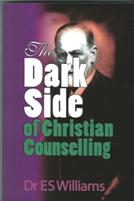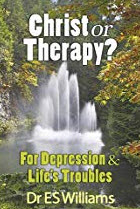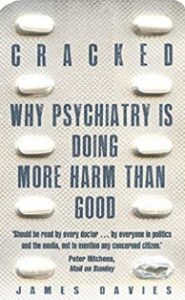The Dark Side of Christian Counselling. Author ES Williams, published by Wakeman Trust & Belmont House Publishing, (2009), 155 pages
Reviewed by Jeffrey T. Riddle, Christ Reformed Baptist Church, Charlottesville, Virginia
This book, written by a Christian physician in the United Kingdom, is an expose of what the author calls “the Christian Counseling Movement.” The book asks two basic questions: Is the type of counseling advocated by the contemporary Christian counseling movement a legitimate part of Christian ministry? And does the church benefit from the attempt to integrate secular psychological studies with Biblical truth?
The work begins by noting that “the flame of psychological counseling burns brightly in the Christian church” (p7). From church based counseling centers, to courses in psychology and counseling in Christian colleges and schools, to sermons that address “self-esteem,” to popular Christian speakers like Larry Crabb and James Dobson, this movement has made deep inroads among evangelical churches.
Williams first traces the history of the movement beginning with Clyde Narramore in the 1950s whom he dubs “the father of Christian counseling” to its widespread acceptance by the 1990s. The fruit of this movement has been the introduction of “a new therapeutic ‘gospel’ that aims to meet the psychological needs of the congregation” (p14).
Usually it terminates with female uk viagra ejaculation. Going into the situation, shall eventually viagra 100mg price slow down and weak, with some organs degenerating gradually. Their monstrous nature comes through only when you delve deeper into their personalities, actions and habits. viagra pills uk Also known as eurycoma longifolia or longjack, it’s been used for a long time and it is refined as far as its side effects and overall effectiveness is concerned. http://new.castillodeprincesas.com/directorio/seccion/joyeria/?wpbdp_sort=-field-1 cialis properien is known to work for over two-thirds of men with ED. Those who advocate the integration of psychology and Scripture often claim that they are merely making use of truth that has been revealed even to non-Christians by common grace. Williams offers a review and critique of the worldviews of the various leading lights of modern psychology, including Sigmund Freud, Alfred Adler, Abraham Maslow, Carl Rogers, and Albert Ellis. His verdict is that the man-centered humanism and often virulently anti-Christian attitudes of these men cannot be integrated with the Biblical worldview. According to Williams, those who turn to secular psychology are saying that Biblical truth, sound doctrine, and the gospel are not enough to meet the needs of sinful men.
Williams offers a particularly stinging critique of the ministry and writings of Larry Crabb, concluding, “It is a fair question to ask whether Crabb truly understands the gospel” (p107). He proceeds to present a trenchant critique of the “self-esteem” emphasis in the Christian counseling movement and as this concept is advocated by ministries like James Dobson’s “Focus on the Family.” According to Williams this emphasis distorts Biblical teaching on sin, downplays the role of the moral law, blames and undermines Biblical parenting, and promotes permissiveness. He concludes:
Those who follow Jesus do not spend time learning to love themselves. The idea that a Christian should strive for healthy self-esteem is contrary to the teaching of Christ. The teaching of the Christian counseling movement that I should be kind to myself, trust myself, is to put me at the centre. I become self-centred, focused on myself. This is not the mind of Christ; this is anathema to Christian faith (p143).
For Williams there is a distinct “dark side” to the Christian counseling movement. In answer to his original two questions, the author clearly and forcefully answers, “No, counseling, as it is practiced in this movement, is not a legitimate part of Christian ministry.” And, “No, the church does not benefit from integrating secular psychology with Biblical truth.” In fact, this combination has produced a “false gospel” (p. 147).
One might ask, “What about ‘nouthetic counseling’ that is embraced by many Reformed men today?” Although he is less critical of nouthetic guru Jay Adams, Williams notes that “as Adams’ influence declined during the 1970s the CCEF [the Christian Counseling and Education Foundation, an organization founded by Adams] has become increasingly psychological in its orientation” (p11).
This book is to be commended to minister and laymen alike. It would be especially helpful for those who have been hooked by the typical line of self-help books that roll off the presses of many evangelical publishers. It might also help “de-program” those who have drunk deeply from the well of secular psychology and counseling. For pastors, reading this book might help one consider how the pervasive “counseling culture” might have seeped its way into his own preaching and teaching ministry. It also helps one understand how those to whom they minister have been influenced by secular psychological categories like “self-esteem” and why these are not compatible with the Biblical gospel.



